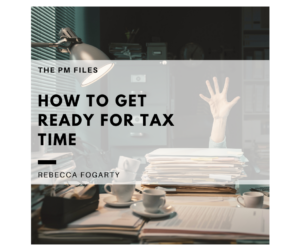
As the financial year comes to an end, it’s time to get everything prepared so you can complete your tax return. Taking proactive measures now is essential to ensure a seamless and efficient tax filing process for you and your accountant. By getting organised early, you can minimise administrative challenges and get your tax return done faster, which is particularly appealing if you’re due to get a refund. Keep reading below for several steps to prepare for tax time effectively.
Have a dedicated tax folder
Whether electronic or physical, you should have a dedicated place to keep all the documents and information you need to prepare your tax return. This includes bank statements, receipts, rental ledgers, and anything else that will help provide as much information as possible. An easy way to keep your receipts organised is to take a photo or download the receipt (if it’s electronic) and save it to a folder on your computer. At tax time, all you’ll need to do is open this folder or send the files to your accountant if you have a professional complete your tax return.
Review your income for the financial year
If you’ve had multiple lease agreements throughout the financial year or leased short-term rentals, you’ve likely received multiple sources of rental income. Ensure you have comprehensive records of all income derived from your investment properties using bank statements, spreadsheets, or dedicated accounting software to accurately track and document your earnings.
Pre-pay your interest to reduce your marginal tax rate
If it’s looking like your income is about to end up in a higher tax bracket, and you have a fixed-rate loan, you can pre-pay your interest for the next 12 months. You can then claim this as a deduction in this financial year to reduce your taxable income.
Get repairs and maintenance done before EOFY
If any repairs and maintenance are required at your investment properties, consider completing these just before EOFY. It’ll allow you to claim a deduction when you prepare your tax return while reducing the time between spending and getting your refund.
Don’t forget there is a difference between repairs and replacements. Renovations or replacement items often can’t be claimed as a total but can be depreciated costs.
Don’t forget about depreciation
A common thing property investors forget about at tax time is depreciation. It can boost your tax return, helping you derive the most value possible from your investments as you maximise your returns while minimising outgoings. If you haven’t already, have a depreciation schedule drawn up to make sure you get the most out of each tax time.
Preparing for tax season can be daunting, especially with the myriad details to keep track of. If you’re unsure which deductions are allowable and which aren’t, talk to your accountant for clarification. By seeking guidance from a professional, you can ensure compliance with ATO regulations while also maximising the value of your refund.
Remember, this article is general in nature and is not financial or legal advice. Please consult your professional financial and legal advisors before making any decisions for yourself.

